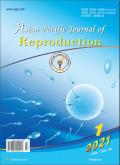Placental pathologies and fetal outcome in pregnant women with COVID-19: A retrospective study
IF 0.6
Q4 REPRODUCTIVE BIOLOGY
引用次数: 0
Abstract
Objective: To describe histopathologic findings in the placentas in women with coronavirus disease 2019 (COVID-19) during pregnancy. Methods: In a cross-sectional study, 38 pregnant women with COVID-19 and undergoing delivery between March 2020 and January 2022, were included. The patients had positive polymerase chain reaction (PCR) test for SARS-CoV-2 infection and the placentas after delivery were sent for histopathologic evaluation based on the Amsterdam Placental Workshop Group Consensus Statement and assessed by two pathologists. Results: Our results showed that maternal vascular malperfusion was the most common and was present in 17 cases (44.7%). These features included accelerated villous maturation (36.8%) distal villous hypoplasia (5.3%), placental infarction (5.3%) and intervillous fibrin deposition (10.5%). Other pathologic findings included focal calcification (10.5%), intravillous congestion and hemorrhage (10.5%), sub-chorionic hemorrhage (5.3%), acute villitis, chronic histiocytic intervillositis and delayed villous maturation each in one case (2.6%). Twelve out of 38 cases showed no significant pathologic changes. Fetal outcomes included neonatal intensive care unit admission rate of 13.2%, dyspnea 31.6%, newborn’s anosmia 7.9%, intrauterine fetal demise 2.6%, asphyxia 2.6% and neonate COVID infection 5.3%. Conclusions: Microvasculopathy, as a sign of maternal vascular malperfusion, is a common finding in placentas from SARS-CoV-2 positive pregnant women in the present study. Further studies with larger sample sizes and comparative studies between COVID-19 positive and negative, as well as information from patient follow-up are suggested.COVID-19孕妇的胎盘病理和胎儿结局:一项回顾性研究
目的:描述2019冠状病毒病(COVID-19)妇女妊娠期间胎盘的组织病理学表现。方法:在一项横断面研究中,纳入了38名在2020年3月至2022年1月期间分娩的COVID-19孕妇。患者SARS-CoV-2感染聚合酶链反应(PCR)阳性,分娩后的胎盘根据阿姆斯特丹胎盘研讨会小组共识声明并由2名病理学家进行组织病理学评估。结果:以母体血管灌注不良最为常见,共17例(44.7%)。这些特征包括绒毛成熟加速(36.8%)、远端绒毛发育不全(5.3%)、胎盘梗死(5.3%)和绒毛间纤维蛋白沉积(10.5%)。其他病理表现包括局灶性钙化(10.5%),绒毛内充血出血(10.5%),绒毛膜下出血(5.3%),急性绒毛炎,慢性组织细胞绒毛间炎和绒毛成熟延迟各1例(2.6%)。38例中有12例未见明显病理改变。新生儿重症监护病房住院率为13.2%,呼吸困难率为31.6%,新生儿嗅觉缺失率为7.9%,宫内死胎率为2.6%,窒息率为2.6%,新生儿新冠肺炎感染率为5.3%。结论:微血管病变是母体血管灌注不良的标志,是本研究中SARS-CoV-2阳性孕妇胎盘的常见发现。建议进一步开展更大样本量的研究、COVID-19阳性与阴性的比较研究以及患者随访信息。
本文章由计算机程序翻译,如有差异,请以英文原文为准。
求助全文
约1分钟内获得全文
求助全文
来源期刊

Asian Pacific Journal of Reproduction
Veterinary-Veterinary (all)
CiteScore
1.70
自引率
0.00%
发文量
588
审稿时长
9 weeks
期刊介绍:
The journal will cover technical and clinical studies related to health, ethical and social issues in field of Gynecology and Obstetrics. Articles with clinical interest and implications will be given preference.
 求助内容:
求助内容: 应助结果提醒方式:
应助结果提醒方式:


